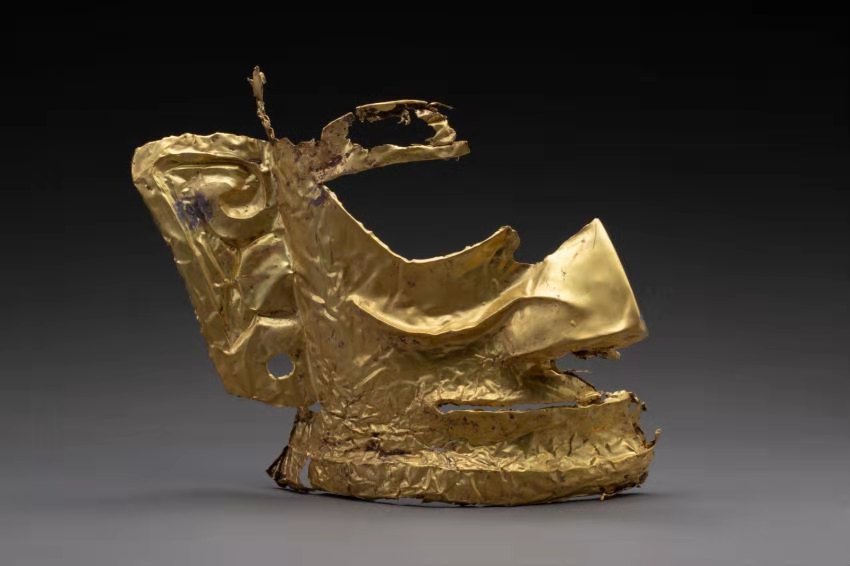New discoveries at Sanxingdui Ruins shed light on unified, diverse origins of Chinese civilization

Photo shows a gold mask unearthed from an ancient sacrificial pit at the Sanxingdui Ruins site in southwest China's Sichuan province. [Photo/Courtesy of Sichuan Provincial Cultural Relics and Archaeology Research Institute]
Major discoveries made at the renowned Sanxingdui Ruins site in southwest China's Sichuan province have shed light on the unified and diverse origins of the Chinese civilization, according to Chinese archaeologists.
Archaeologists have found six new sacrificial pits and unearthed over 500 important cultural items dating back about 3,000 years from four of the pits at the Sanxingdui site, including pieces of exquisite gold masks, gold foil, bronze masks, bronze trees, ivories, pieces of miniature ivory sculptures and jade.
Of particular note, a fragment of a gold mask, about 23cm wide and 28cm long, found in one of the pits, surprised the archaeologists with its relatively large size compared to previous archaeological findings. The rest of the newly discovered pits are still under excavation.
The six artificial pits will help archaeologists gain a comprehensive understanding of the sacrificial scenes, religious thought and concept of the universe in ancient times, said Sun Hua, a professor from Peking University.
The ancestral types of some newly-discovered bronze items can be found in the Central Plains or other areas along the Yangtze River, which serves as vivid evidence of frequent exchanges between ancient Sichuan and the Central Plains, said Ran Honglin, a researcher with the Sichuan Provincial Cultural Relics and Archaeology Research Institute.
Chen Xiandan, the institute's former deputy head who took part in the 1986 excavation of the site, said these artifacts show the Sanxingdui site had a close connection with Central China.
These precious items fully illustrate that ancient Sichuan culture and the regional culture in the Yangtze River basin are an integral part of the Chinese civilization, said Song Xinchao, deputy director of the National Cultural Heritage Administration.
Song added that the new findings serve as crucial physical evidence of the unified and diverse origins of the Chinese civilization.
Song called on archaeologists to study and analyze the latest findings at the Sanxingdui site and compare them with other archaeological discoveries in the Sichuan basin and its surrounding areas, so as to better understand the origin of Sanxingdui culture and the significant role of the regional culture of the Yangtze River basin.
The views don't necessarily reflect those of Qiushi Journal.
























